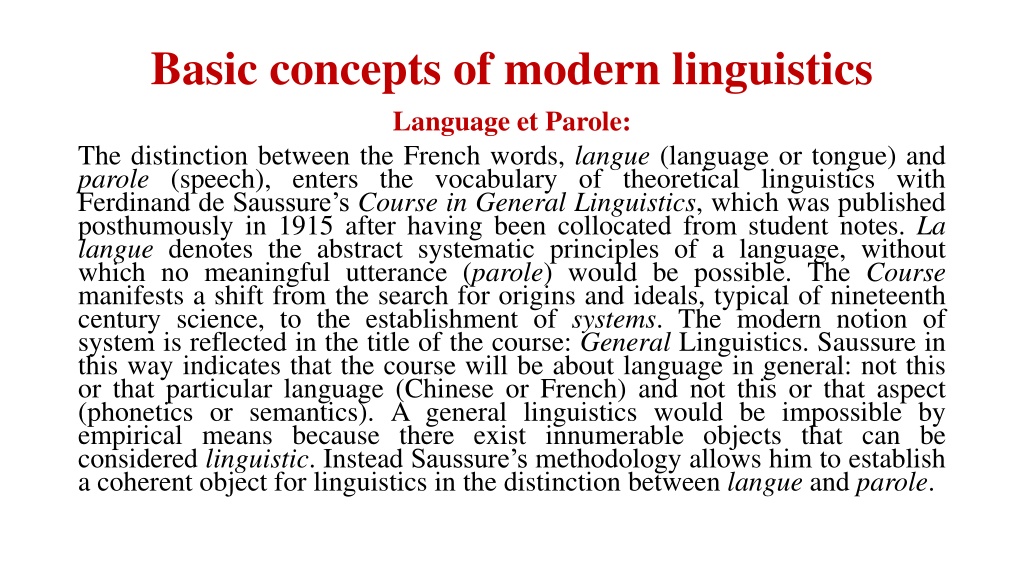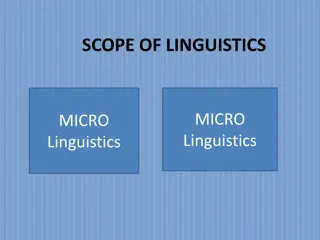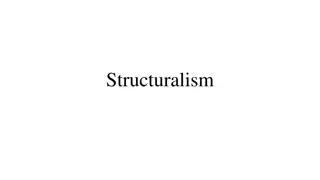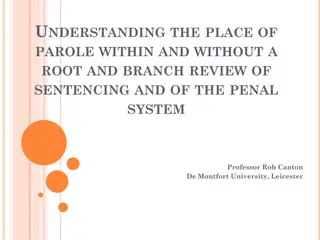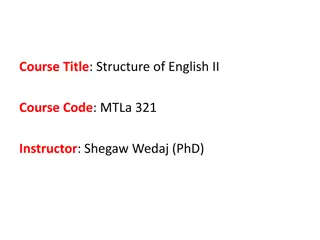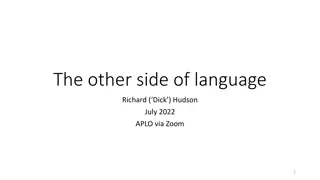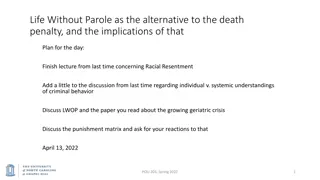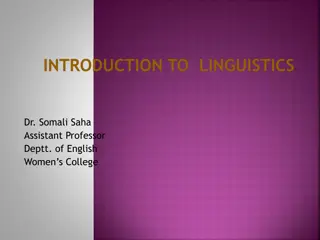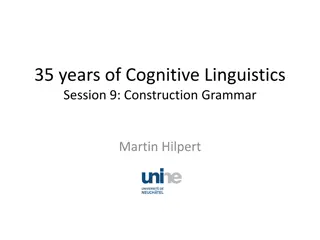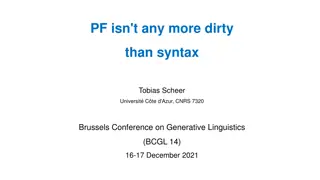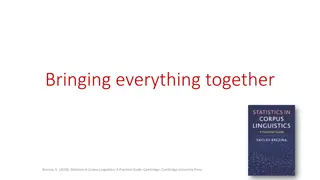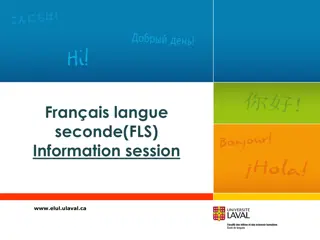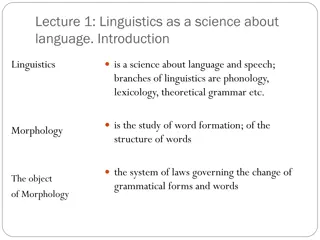Understanding Saussure's Concepts of Langue and Parole in Modern Linguistics
The concepts of Langue and Parole introduced by Ferdinand de Saussure in the field of modern linguistics distinguish between the abstract systematic principles of language (Langue) and individual speech acts (Parole). Saussure's emphasis on the study of Langue as the foundation for meaningful utterances highlights the importance of underlying language norms and conditions. The linguistic system is viewed as a web of interconnected signs, where each element corresponds to organized mental phenomena. Saussure's ideas on signs, meanings, and values shape the framework of structuralism and semiotics in understanding language systems.
Download Presentation

Please find below an Image/Link to download the presentation.
The content on the website is provided AS IS for your information and personal use only. It may not be sold, licensed, or shared on other websites without obtaining consent from the author. Download presentation by click this link. If you encounter any issues during the download, it is possible that the publisher has removed the file from their server.
E N D
Presentation Transcript
Basic concepts of modern linguistics Language et Parole: The distinction between the French words, langue (language or tongue) and parole (speech), enters the vocabulary of theoretical linguistics with Ferdinand de Saussure s Course in General Linguistics, which was published posthumously in 1915 after having been collocated from student notes. La langue denotes the abstract systematic principles of a language, without which no meaningful utterance (parole) would be possible. The Course manifests a shift from the search for origins and ideals, typical of nineteenth century science, to the establishment of systems. The modern notion of system is reflected in the title of the course: General Linguistics. Saussure in this way indicates that the course will be about language in general: not this or that particular language (Chinese or French) and not this or that aspect (phonetics or semantics). A general linguistics would be impossible by empirical means because there exist innumerable objects that can be considered linguistic. Instead Saussure s methodology allows him to establish a coherent object for linguistics in the distinction between langue and parole.
Langue and Parole Langue represents the work of a collective intelligence, which is both internal to each individual and collective, in so far as it is beyond the will of any individual to change. Parole, on the other hand, designates individual acts, statements and utterances, events of language use manifesting each time a speaker s ephemeral individual will through his combination of concepts and his phonation the formal aspects of the utterance. Saussure points out that the single word linguistics therefore covers two very different kinds of study. The study of parole would be entirely focused on individual utterances, using all the available resources of formal and empirical study to analyze actual statements, usually within a specific language. The study of langue would be focused instead on generally applicable conditions of possibility. The Course thus follows the second route in this inevitable bifurcation, setting out the groundwork for all attempts to grasp the basic conditions of possibility for language and language use generally. There would be no coherent and meaningful utterance without the institution of norms that Saussure calls langue. So it is this that forms the object of study for modern linguistics. Such an object could not ever be made visible (as a stretch of text can) but one can in principle establish the rules and conditions that make it possible to speak and write in meaningful ways. Langue and parole has been translated by alternative semiotic categories like system and process (A J Greimas) or code and message (Roman Jakobson), which interpret Saussure s distinction in specific ways. The main assumptions of structuralism and semiology (or semiotics) would be that for every process (an utterance for instance) there is a system of underlying laws that govern it; and that the system arises contingently (there are no natural or necessary reasons for the relations within it to be as they are).
Langue and Parole The scientific approach to systems, inherited by Saussure, assumes that the elements which make them up correspond to organized and integrated unities. Each element in a system should be located in its place on the web of relationships between elements. The elements of the linguistic system are, however, the mental phenomena called signs. A sign is comprised of both a mental image (signifier) and an idea (signified). Saussure s most famous statement concerns how these signs are differentiated in themselves and related to each other. In language, he says, there are only differences without positive terms. He distinguishes between meaning and value to get the point across. What we find, instead of ideas being given in advance, are values emanating from a linguistic system. If we say that these values correspond to certain concepts, it must be understood that the concepts in question are purely differential. That is to say they are concepts defined not positively, in terms of their content, but negatively by contrast with other items in the same system. What characterizes each most exactly is being whatever the others are not . The notion of value thus designates a quality that is entirely relative to other values in the system. The concept of a dog or a cat, a virtue or a crime, gets its value as a linguistic unit entirely relative to the values of all the other linguistic units. So no linguistic unit can be regarded as a positive pre-existing entity or idea (whether concept or mark). To define a linguistic unit, rather, is to specify in what ways it is similar to or different from the other units within the system. Two marks a and b are not, despite appearances, grasped positively by our consciousness. We grasp the difference between a and b etc. It is for this reason, Saussure says, that each sign remains free to change in accordance with laws quite unconnected with their signifying function . Linguistic items are therefore always based, ultimately, upon their non-coincidence with the others. This what also allows considerable flexibility in their relations the play between signifiers and between signifiers and signifieds, their difference.
Langue and Parole Langue and parole are more than just 'language and speech' (although this is a useful quick way of remembering them). La langue is the whole system of language that precedes and makes speech possible. A sign is a basic unit of langue. Learning a language, we master the system of grammar, spelling, syntax and punctuation. These are all elements of langue. Langue is a system in that it has a large number of elements whereby meaning is created in the arrangements of its elements and the consequent relationships between these arranged elements. Parole is the concrete use of the language, the actual utterances. It is an external manifestation of langue. It is the usage of the system, but not the system. By defining Langue and Parole, Saussure differentiates between the language and how it is used, and therefore enabling these two very different things to be studied as separate entities. As a structuralist, Saussure was interested more in la langue than parole. It was the system by which meaning could be created that was of interest rather than individual instances of its use. Mikhail Bakhtin (1929) criticized the splitting of langue and parole as separating individuals and society where it matters most, at the point of production. He developed a 'dialogic' theory of utterances where language is understood in terms of how it orients the speaker/writer to the listener/reader. Words are subject to negotiation, contest and struggle. Language is strongly affected by social context. Modification of langue at the point of parole is used to create new meaning, either where the speaker has limited grasp of language or where deliberate distortion is used.
Langue and Parole Within the discipline of linguistics, it allows the linguist to identify two distinct objects for study. On the one hand, parole names the concrete usage of language in a particular social group, through its various permutations and conventions; on the other hand, langue names the system or set of rules that makes any individual usage of language (parole) possible. The distinction might seem a rather familiar form/content pairing, but I think it was quite a novel way of looking at language, and has influenced linguistics and language teaching considerably. For instance, the distinction between langue and parole has likely led to an increased emphasis on teaching students the general rules and structure of a language (either via study of grammar, or practicing using it), with less focus on vocabularly and learning phrases by rote. In French philosophy this distinction received a lot of attention in part because Saussure claims that langue, the structure of language, is not a function of the speaking subject . This claim has strong anti-idealist tones that contrasted with the popular strains of phenomenology and existentialism prevalent at the time, along with Hegelian readings of language from figures such as Hyppolite. Saussure s claim that the system of language is organized before or exceeds the subject was exactly the antidote desired by a number of thinkers looking for paths out of these contemporary philosophical attitudes. It has been taken up in Marxists (Althusser) and psychoanalysts (Lacan), numerous other thinkers (Derrida, for instance). For psychoanalysis, langue became a new way of thinking about the unconscious (the symbolic order). For Marxist thought the relations and codes of langue were the relations and codes of society. It gave literary critics and sociologists, for example, a theoretical framework, according to which they would now look for the underlying structure of a text or society. I m sure this is more or less what they were already doing, but calling it structuralism and having it all underwritten by a trendy, scientific linguistics adds a sense of purpose and support, no? If the system that ultimately gives meaning to our utterances is independent of any individual speaker or author, then the idea that the author s intentions ought to be the chief basis for interpreting a text is put into question. That has been an influential insight! The idea that the system of language (i.e. what gives it meaning) is independent of the subject has been incredibly influential in all sorts of disciplines. Even the basic distinction between system and usage has led to a difference of focus in things like language teaching. See also https://www.youtube.com/watch?v=jiH1b8L_hjM
Langue and Parole Langue, the system of language, coded in our minds, and it dictates how the things will come out of our mouths. When we find some expression ungrammatical (in its linguistic sense), it's because it is against langue. This is however an abstract system, and when words come out, the result is parole. That's the actual representation of langue. Parole has all the varying outcomes of language, whereas langue, the system behind it, is homogeneous. One can assume that the parole side of language is social. Sociolinguists research this social variation occurring for example in different situations. But when we observe language as an entity, this side is really individual. It sounds paradoxical, but it is langue that is social. Although it is the abstract system in everybody's brains, it is formed socially: we got the system of language when we as little children listen to grown-ups. The system in our cognition comes to be as it is because the others have it in that form as well. One can easily think that langue is the core where everything comes from. Well, it is in that sense that we produce and understand language based on it. But still it is not, because it exists because of parole. We wouldn't have langue in our heads if we hadn't first heard parole. Parole also causes the changes to the langue. The individual ways of speaking always change for some reason, and when the changes spread to masses of speakers, they become part of langue, and thus they will be used because the abstract codex says so. This is why the nature of this abstract system is social.
Langue und Parole Saussure unterscheidet bei der Sprache dreiAspekte, die er mit drei unterschiedlichenAusdr cken bezeichnet: Langage ist dabei die menschliche Sprache an sich, das biologische Verm gen des Menschen zu sprechen; Langue verweist auf eine Sprache im Sinne einer bestimmten Einzelsprache wie Franz sisch oder Deutsch, als ein abstraktes System von Regeln, aber auch auf innersprachliche Systeme (Lautsprache Geb rdensprache); Parole ist das Sprechen, also der konkreteAkt des Sprachbenutzers, der spezielle Sprachgebrauch. Der Begriff langage bezeichnet die menschliche Sprache als vortheoretischen Ph nomenbereich, also so, wie sie den Sprechern in der Sprecht tigkeit begegnet. Demgegen ber ist die langue als theoretischer Sprachbegriff zu verstehen, der eine erkenntnislogische Ordnung in den vortheoretischen Ph nomenbereich der menschlichen Rede, des langage, bringt. Die langue kann also begriffen werden als sprachwissenschaftliche Perspektive, unter der die langage betrachtet wird. Langue hat eine soziale und eine individuelle Dimension: In ihrer sozialen Dimension (fait social) ist langue eine intersubjektiv geltende gesellschaftliche Institution, ein sozial erzeugtes und in den K pfen der Sprecher aufgehobenes, konventionelles System sprachlicher Gewohnheiten. In ihrer individuellen Dimension ist sie mentales dep t , bzw. magasin (etwa: Warenlager) einer subjektiv internalisierten Einzelsprache (also sozusagen die subjektive Fassung der langue). Auch der Begriff der parole hat eine soziale und eine individuelle Seite. Er meint einmal den konkreten Sprechakt, also die individuelle Realisierung der langue durch den je einzelnen Sprecher (hic et nunc) gebundene, raum-zeitliche Realisierung des Systems. Zugleich ist die parole aber in ihrer sozialen Dimension der Ort der dialogischen Hervorbringung neuen sprachlichen Sinnes, also der Ort der Genesis und Ver nderung der langue. Langue und parole stehen also in einem komplexen Verh ltnis der wechselseitigen Bedingtheit: Auf der einen Seite gibt es nichts in der langue, das nicht durch die parole zuvor in sie gelangt w re. Andererseits ist die parole nur m glich aufgrund jenes sozialen Produktes, das langue hei t. Die parole kann unmittelbar beobachtet werden, die langue hingegen nicht. Nur im Nachhinein kann auf sie geschlossen werden, wenn man den Entstehensprozess sprachlicher Zeichen rekonstruiert, also die Artikulation. Sie ist zu verstehen als theoretischerAspekt des menschlichen Sprachverm gens, der langage.
Langue et Parole En s parant la langue de la parole, on s pare du m me coup : ce qui est social de ce qui est individuel Ce qui est essentiel de ce qui est accessoire et plus ou moins accidentel. La langue n'est pas une fonction du sujet parlant, elle est le produit que l'individu enregistre passivement. (...) La parole est au contraire un acte individuel de volont et d'intelligence. (...) R capitulons les caract res de la langue : Elle est un objet bien d fini dans l'ensemble h t roclite des faits de langage. On peut la localiser dans la portion d termin e du circuit o une image auditive vient s'associer un concept. Elle est la partie sociale du langage, ext rieure l'individu, qui lui seul ne peut ni la cr er ni la modifier ; elle n'existe qu'en vertu d'une sorte de contrat pass entre les membres de la communaut . D'autre part, l'individu a besoin d'un apprentissage pour en conna tre le jeu ; l'enfant ne se l'assimile que peu peu. Elle est si bien une chose distincte qu'un homme priv de l'usage de la parole conserve la langue, pourvu qu'il comprenne les signes vocaux qu'il entend. La langue, distincte de la parole, est un objet qu'on peut tudier s par ment. Nous ne parlons plus les langues mortes, mais nous pouvons fort bien nous assimiler leur organisme linguistique. Non seulement la science de la langue peut se passer des autres l ments du langage, mais elle n'est possible que si ces autres l ments n'y sont pas m l s. Tandis que le langage est h t rog ne, la langue ainsi d limit e est de nature homog ne : c'est un syst me de signes o il n'y a d'essentiel que l'union du sens et de l'image acoustique, et o les deux parties du signe sont galement psychiques. La langue n'est pas moins que la parole un objet de nature concr te, et c'est un grand avantage pour l' tude. Les signes linguistiques, pour tre essentiellement psychiques, ne sont pas des abstractions ; les associations ratifi es par le consentement collectif, et dont l'ensemble constitue la langue, sont des r alit s qui ont leur si ge dans le cerveau. En outre, les signes de la langue sont pour ainsi dire tangibles ; l' criture peut les fixer dans des images conventionnelles, tandis qu'il serait impossible de photographier dans tous leurs d tails les actes de la parole .(...) C'est cette possibilit de fixer les choses relatives la langue qui fait qu'un dictionnaire et une grammaire peuvent en tre une repr sentation fidele.
References https://pdfs.semanticscholar.org/b1f3/c0b40cf7d8c88f59ee993b882 e3c9105a586.pdf by John Phillips http://changingminds.org/explanations/critical_theory/concepts/lang ue_parole.htm https://www.quora.com/What-is-so-important-about-Saussures- langue-and-parole http://www.psyalpha.net/biografien/ferdinand-de- saussure/ferdinand-de-saussure-langage-langue-parole-signifikant- signifikat-bedeutung https://www.ac- grenoble.fr/PhiloSophie/logphil/textes/textesm/saussu3m.htm
